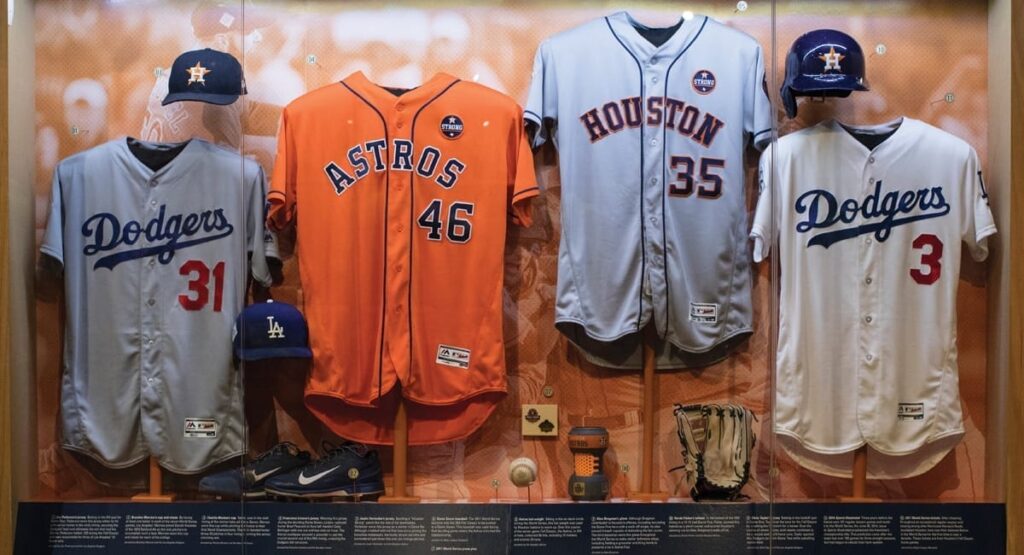The baseball hall of fame has been the hallmark of achievement for professional baseball players since its inception in 1936. As of 2025, 278 former players have been inducted into Cooperstown, making it an extremely exclusive club. But what if I told you that there are several more deserving players who have in all essence been blackballed from the hall of fame?
The character clause, adopted in 1945, gave voters a set of rules to keep in mind when selecting the next class of the baseball hall of fame. It states that players, “shall be chosen on the basis of playing ability, sportsmanship, character, their contribution to the teams on which they played and to baseball in general.” But this clause that can prevent deserving players into the hall of fame is antiquated and outdated.
There are many former players who have essentially been erased from the history books and that just isn’t fair due to their contributions to the game.
Most of this controversy stems from the steroid era that occured from 1994-2004. During this time period, many players were either caught and admitted to taking performance enhancing drugs (PEDs), under heavy suspicion of taking PEDs but didn’t have enough evidence to know for sure or were just not caught.
While the number is subject to debate, at least half the major leaguers during this era were allegedly taking PEDs.
“I don’t know what the percentage was, but I bet at least 50-60% of the guys were doing stuff,” MLB Insider and USA Today columnist Bob Nightengale said.
Some guys who took steroids that were caught or under heavy suspicion such as Alex Rodriguez, Sammy Sosa and Mark McGwire should be barred from entry into the hall of fame as they definitely cheated, and eventually got caught. But there is a gray area to this. Rodriguez, Sosa and McGwire were not considered to be hall of famers before they were alleged to have started taking steroids.
While the exact dates are not known and probably will never be known, the aforementioned former players allegedly started very early in their careers and had not cemented their legacy before they started cheating.
But again, there is a gray area to this. Among the long list of former players that allegedly took steroids, two stand out: Barry Bonds and Roger Clemens.
Both of these players were considered to be first-ballot hall of famers before they allegedly started using steroids.
Bonds was on a historic path before he allegedly started cheating in 1999. He was on pace to become the only player in MLB history to hit 500+ home runs and steal 500+ bases, and already had 400+ home runs and 400+ stolen bases.
While he eventually did become the only player to accomplish this feat, he went much further in that, breaking Henry Aaron’s home run record, breaking the record for Wins Above Replacement (WAR), walks, intentional walks, en route to winning a record seven Most Valuable Player (MVP) awards.
At the height of his powers in 2001, he hit a record 73 home runs that still hasn’t been touched. But because of the legacy he already had with the Pittsburgh Pirates and San Francisco Giants, I believe he should be let in. But the Baseball Writers’ Association of America (BBWAA) does not agree with this now-popular sentiment.
As for Clemens, he also allegedly started taking steroids in 1996 or 1997. Before 1996, he was well on his way to being considered as one of the greatest pitchers of all-time, winning three Cy Young awards and an MVP. But the alleged use of steroids also tarnished his legacy.
Both players were up for consideration 10 times to be enshrined in Cooperstown, and all 10 times they fell short of the 75% voting threshold needed to be enshrined.
Both retired in the same year (2007) and will now be subject to the Veterans Committee as they didn’t get in from the BBWAA. Will they get in from this? That remains to be seen. However, I believe that they have done their time and should be in. Nightengale, who has been a member of the BBWAA and therefore gets the privilege to vote on the hall of fame, agrees with this sentiment.
“Bonds is arguably the best hitter since Babe Ruth, and Clemens was one of the best right-handed pitchers of all time,” Nightengale said. “Obviously, many of the people didn’t agree with me, or else they’d be in the Hall of Fame. But there was no testing at the time… and so, I voted for those guys every year they were eligible.”
However, there are more former players snubbed from hall of fame induction due to the character clause that should be in. Two former players come to mind, both with completely different reasons for not being allowed: Curt Schilling and Pete Rose.
Schilling, a member of the 3000 strikeout club and 200 win club, has still not been inducted and is currently off the ballot as his 10 years of eligibility with the BBWAA have also passed. Every player eligible for the hall of fame that has had 3000+ strikeouts has been inducted with the exception of Clemens and Schilling. But Schilling was never suspected of taking steroids. His absence is for a completely different reason.
After his playing career, Schilling was under fire several times for expressing his radical political views, including being caught with a collection of Nazi uniforms and was fired as a commentator from ESPN because of this. In addition, while he wasn’t officially barred from hall of fame, he has been all but blackballed from consideration.
While I don’t agree with his political views, nor do most of the general public, I still think that post-career political views should not prevent a deserving player from being enshrined in the hall of fame. Nightengale and White Sox Scout John Kazanas agree with me on this.
“It’s a little bit of a gray area,” Nightengale said. “But when you throw in the character clause, when he started going off and expressing all his views, which
upset a lot of people, he wasn’t doing that as a player. He wasn’t a divisive force in the clubhouse. So, we’re voting on him strictly as a player. Now, if you want to knock him for not having enough career wins, that’s fine. But I don’t know if you should knock him just for his stance on different political things and all that, now that he’s out of the game.”
“I do think it should be based on his performance and success,” Kazanas said. “We’re all entitled to the first amendment and you know that shouldn’t have been held against him in my opinion.”
As for Rose, this is another extraordinary situation where a deserving player has not been inducted. But the difference between the aforementioned players and Rose are that he got a lifetime ban from former MLB Commissioner A. Bartlett Giamatti, which is still being upheld by current MLB Commissioner Rob Manfred.
This lifetime ban stemmed from an MLB investigation that provided evidence that Rose bet on Reds games while managing the team. Whether he for sure actually placed bets on the team to win or lose is still unknown, but nevertheless he received a lifetime ban.
If he had placed bets on his team to lose and willingly threw games to make money like the 1919 Chicago White Sox, then it would have been absolutely justified. But Rose maintained his position that he never placed bets against his team until his death in 2024. If this is the case, I don’t see why Manfred can’t posthumously lift his lifetime ban.
The fact of the matter is, Rose was a legend. He holds the record for most games played, plate appearances, at-bats and most importantly, has the most hits in MLB history, a record that will likely never be touched. While I’m not the only one who maintains this opinion, many baseball writers and people surrounding baseball support the lifetime ban.
“There’s a huge sign at every clubhouse,” Kazanas said. “It says, ‘betting on baseball you don’t do’. I’m paraphrasing but I don’t know for sure if he bet on baseball. But if he bet on other sports, he’s not the first one as a professional athlete to bet. So again if he bet on football and basketball and all that kind of stuff, I don’t think it should be held against him for baseball. But if he did bet on baseball, then that’s that gray area that he bet for his team or against his team, and had inside info. Then that’s warranted to not be elected in the hall of fame.”
“I will say, all those times in the clubhouse, there were always signs that said, ‘no gambling’” Nightengale said. “Never, ‘don’t take steroids’ or anything like that. It was always a gambling thing. So I think if they lift the lifetime ban, it could create a little problem because we’re seeing minor league players get banned for life. And an umpire just did that: Pat Hoberg.”
So it all comes down to this: should the character clause be modified, or even abolished? It’s very apparent that the clause is outdated and needs to be modified in order to allow people that are deserving in the hall of fame. I’m not saying to enshrine Rodriguez, Sosa or McGwire, but the players that are deserving should get in.
But I have one caveat-put an asterisk next to their names and detail why they were previously omitted from history. Will this be done? That remains to be seen. But there is one thing I know, Manfred needs to do this in order to preserve the history of baseball and keep the fans happy, and therefore the game alive.


